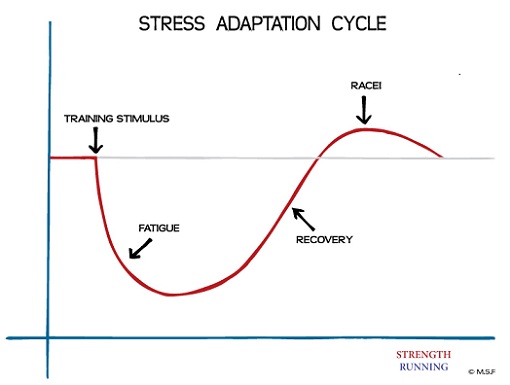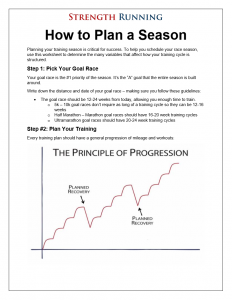Stress: it conjures images of uncooperative toddlers, looming deadlines at work, and arguments with your spouse. But is stress actually a bad thing?

The answer (of course) is two-sided. Some stress can help you achieve more, accomplish difficult tasks, and excel. But too much stress – and the wrong kinds – can wreak havoc on your ability to train and recover.
There are two types of stress: good and bad.
Good stress, also known as eustress, is positive. Like an upcoming exam forces you to study hard, eustress has a positive impact. It motivates you. It forces you to take action.
Eustress should be embraced – rather than trying to reduce stress of this type, it’s better to harness and use it to your advantage.
But eustress is not defined by the type of stressor. Instead, it’s how you perceive stress. Do you look at that big exam as a challenge to be conquered or an inevitable failure that hasn’t happened yet?
Your mindset and reaction to stress is much more important than the stressor itself.
Bad stress, known as distress, is chronic, long-term anxiety that negatively impacts your life:
- Staying in an unhealthy relationship with ongoing conflict
- Hating your job (and not doing anything about it)
- Loathing your 90-minute commute to work every day
If your reaction to a particular stress is strong anxiety or impaired performance, then you’re likely experiencing distress.
This topic is critical for runners, especially those training for stretch goals or to achieve a new personal best.
What are the negative symptoms of stress?
Too much negative stress results in excess cortisol, also known as the “stress hormone.” With chronically elevated levels of cortisol, health risks skyrocket.
According to the American Psychological Association:
Chronic stress can contribute to long-term problems for heart and blood vessels. This long-term ongoing stress can increase the risk for hypertension, heart attack or stroke.
Persistent chronic stress may also contribute to inflammation in the circulatory system, particularly in the coronary arteries, and this is one pathway that is thought to tie stress to heart attack.
And that’s just to the cardiovascular system! Distress also causes myriad problems for the endocrine, gastrointestinal, nervous, and even reproductive systems.
The major consequences of prolonged exposure to elevated stress levels include:
- Elevated blood sugar levels (leading to Type 2 Diabetes)
- Diarrhea, constipation, heartburn, or even vomiting
- Feelings of lethargy or “adrenal fatigue” from a long-term drain on the sympathetic nervous system
- Depression, weight gain, and loss of sleep
Yikes! The general heatlh concerns of stress and anxiety are alarming. And perhaps even alarmingly, I’m not even scratching the surface of what happens to your body with chronic stress.
The New York Times reported on the heavy toll of stress over a decade ago. And the research continues to pile up.
But will these health risks affect your running?
What does stress have to do with running?
Chronic stress can tax the body and make it hard to complete your training. After all, the body can only handle so much distress.
With some of the byproducts being depression (and its corresponding lack of motivation), weight gain, sleep loss, and general fatigue, it’s easy to see how excess stress can be overwhelming for runners.
Challenging workouts, high mileage, and long runs become that much more difficult for those dealing with persistent, high levels of stress.
And soon, hard training and chronic stress join forces to cause over-training syndrome or a lack of consistency.
Say goodbye to your running goals…
It’s important to distinguish between chronic life stress that will negatively impact your running and “normal” training stresses.
“Bad” stresses can be:
- Death of a close family member or friend
- Illness or disease (especially if it impacts your quality of life)
- A very low household income
- Ongoing dangerous work conditions
These sources of anxiety cause the health concerns we talked about and will make running very difficult.
But “good” stresses are enormously helpful. Provided that recovery is sufficient and the workout is appropriate to your ability, these are good stresses:
- A high mileage running program
- A properly designed workout (like a tempo run, fartlek, or interval session)
- Long runs
- Strength workouts
These are all the components of training that help you improve. They can all be overdone, of course, leading to over-training or injury. But not if they’re structured properly.
In fact, stress is required if you want to get faster, stronger, or improve your endurance.
Any hard workout is a stressor that increases cortisol, suppresses the immune system, and inflicts a small amount of muscle damage.
But then, by God, you adapt to it and get faster!

Just recently I interviewed Alex Hutchinson for Team Strength Running. We spent a long time discussing all of the ways that runners try to limit the stress of training:
- Cryosauna treatments
- Compression socks
- Foam rollers and trigger point balls
- Ice baths
- Inflatable leg booties
- Antioxidant supplementation
But usually runners miss the point that training stress is desired, beneficial, and necessary for the physical adaptations that help you run faster.
Instead of always trying to reduce the stress of running, you should instead focus your energy on reducing distress from chronic stressors.
How do I reduce stress?
It would be easy for me to say that to truly achieve your biggest running goals, you should quit your job, win the lottery, and live in a countryside cottage with no distractions.
A stress-free life would allow you to focus all of your energy on running – and you would be able to train uninterrupted and reach all new levels of performance!
But fantasies aren’t practical and certainly won’t help your running. So how can we manage stress and limit its negative impact on our health and running goals?
The first step is to recognize we can’t eliminate all distress, but we can certainly manage it more effectively.
Let’s explore the ways that we can better cope with stress in our daily lives:
- Accept what you can’t control. No amount of road rage or cursing will make that endless wall of traffic move faster. Shit happens. Just smile and move on.
- Give yourself a time-out. If you find yourself in a stressful situation, to walk around the block, hit the punching bag, or otherwise take a break until you’ve cooled off.
- Deep breaths! Cliché or not, taking slow, deep breaths (instead of rapid, shallow breaths) is proven to reduce stress and help you relax. You can also meditate or take a mindful yoga class.
- Go for a run (but make it easy). A short, easy run can help you deal with a stressful life situation. Just don’t add to your stress load by attempting a challenging workout in a very stressful time.
- Give back. Helping others has been shown to reduce mortality risk from stress. Plus, there’s nothing wrong with good karma!
Aside from these tactics, big-picture strategies should focus on resolving chronic conflicts in your life.
Hate your job? Time to pour your energy into a new one where you’re appropriately challenged in a rewarding atmosphere.
Chronic illness? Come to terms with your disease, seek help, or focus all of your attention on getting as healthy as possible.
Bad relationship? Ask the hard questions. Is this a healthy relationship? Or is it a constant source of stress in your life?
Resolving – or simply taking baby steps on the path to resolution – these life stressors can be enormously helpful for your overall health, outlook, and happiness.
And happier, healthier runners are usually faster runners!
Plan Smarter to Manage Training Stress
Limiting and better managing ongoing sources of conflict, pressure, and stress will help you tackle your training much more productively.
Once you’re running, there are then two strategies for running more strategically and intelligently.
First, listen to your body. Q&A with Coach #15 is helpful here:
While you’re running, take inventory of your:
- Breathing (is it too labored for what it should be?)
- Fatigue (do I have a normal amount of energy?)
- Soreness (is my DOMS manageable?)
- Focus (am I engaged with my workouts?)
Listening to the signals that your body is giving you is often the difference between knowing when to cut a run short (and save yourself from an overuse injury) or pushing through only to get hurt.
Next, make sure you’re running smart! This is often the most overlooked aspect of training; poorly designed programming can lead to over-training, injuries, and missed personal bests.
There are several helpful strategies to help you plan more intelligent training:
- Give yourself enough time to train for your goal race (rushed training = risky training)
- When in doubt, sit it out (i.e., don’t run through pain)
- Plan an appropriate length “season” to ensure you stay motivated and have enough rest
- Schedule the right types of tune-up races (and the right number of them) before the goal race
Remember, better planning leads to faster racing!
And I’ve created a free worksheet to help you plan smarter, less stressful running seasons.
It will help you with:
- Scheduling tune-up races
- Deciding tune-up race distances for 5k – marathon races
- The 3 ingredients to your best season ever
The worksheet walks you through the planning process, with even more details about the length of your season from start to finish, how long each “phase” of training should be, and a lot more.
It all starts with a good plan, so make sure you download the Season Planner here.